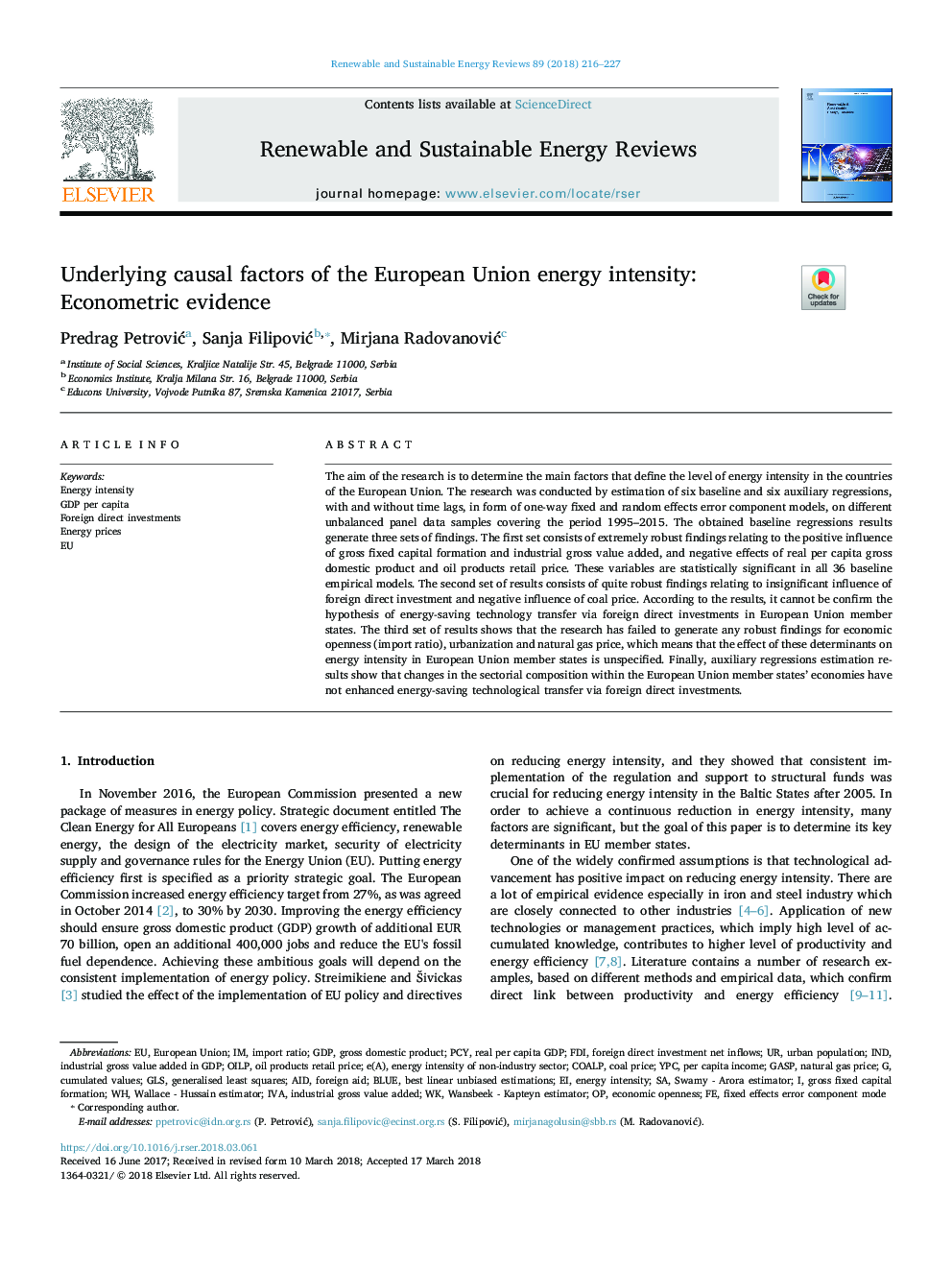| کد مقاله | کد نشریه | سال انتشار | مقاله انگلیسی | نسخه تمام متن |
|---|---|---|---|---|
| 8111384 | 1522295 | 2018 | 12 صفحه PDF | دانلود رایگان |
عنوان انگلیسی مقاله ISI
Underlying causal factors of the European Union energy intensity: Econometric evidence
ترجمه فارسی عنوان
عوامل اصلی عوامل شدت انرژی اتحادیه اروپا: شواهد اقتصاد سنجی
دانلود مقاله + سفارش ترجمه
دانلود مقاله ISI انگلیسی
رایگان برای ایرانیان
کلمات کلیدی
GLSGASPgeneralised least squaresBlue - آبیEuropean Union - اتحادیه اروپاind - اندرEconomic openness - باز بودن اقتصادیGross domestic product - تولید ناخالص داخلیGDP per capita - تولید ناخالص داخلی سرانهGDP - تولید ناخالص ملیUrban population - جمعیت شهریPer capita income - درآمد سرانهForeign direct investments - سرمایه گذاری مستقیم خارجیFDI - سرمایهگذاری مستقیم خارجیEnergy intensity - شدت انرژیEnergy prices - قیمت انرژیCoal price - قیمت ذغال سنگNatural gas price - قیمت گاز طبیعیIVA - مالیات بر ارزش افزودهAID - کمکforeign aid - کمک خارجی
ترجمه چکیده
هدف از این تحقیق تعیین عوامل اصلی تعیین کننده میزان شدت انرژی در کشورهای اتحادیه اروپا است. این تحقیق با برآورد شش شیوه رگرسیون کمکی و با استفاده از مدل های جزئی خطای اثرات ثابت و تصادفی در نمونه های داده های پانلی نامتقارن که در دوره 1995-2015 صورت می گیرد، با و بدون تاخیر زمانی انجام می شود. نتایج رگرسیون پایه بدست آمده سه مجموعه یافته را ایجاد می کند. مجموعه اول شامل یافته های بسیار قوی مربوط به تاثیر مثبت شکل گیری سرمایه ناخالص و ارزش افزوده ناخالص صنعتی و اثرات منفی قیمت خرده فروشی داخلی و تولید ناخالص داخلی واقعی در سرانه می باشد. این متغیرها در همه 36 مدل تجربی پایه، از لحاظ آماری معنی دار هستند. مجموعه دوم نتایج حاصل از یافته های کاملا محکم مربوط به تاثیر ناچیزی از سرمایه گذاری مستقیم خارجی و تاثیر منفی قیمت زغال سنگ است. بر اساس نتایج، فرضیه انتقال فن آوری صرفه جویی در انرژی از طریق سرمایه گذاری مستقیم خارجی در کشورهای عضو اتحادیه اروپا نمی تواند تایید شود. مجموعه سوم نتایج نشان می دهد که تحقیق نتوانسته است به هیچ وجه نتیجه ای برای باز بودن اقتصادی (نسبت واردات)، شهرنشینی و قیمت گاز طبیعی ایجاد کند، که این بدان معنی است که تأثیر این عوامل بر شدت انرژی در کشورهای عضو اتحادیه اروپا مشخص نیست. در نهایت، نتایج برآورد رگرسیون کمکی نشان می دهد که تغییرات در ترکیب بخش بندی در اقتصادهای عضو اتحادیه اروپا، انتقال تکنولوژی صرفه جویی در انرژی از طریق سرمایه گذاری مستقیم خارجی را افزایش نداده است.
موضوعات مرتبط
مهندسی و علوم پایه
مهندسی انرژی
انرژی های تجدید پذیر، توسعه پایدار و محیط زیست
چکیده انگلیسی
The aim of the research is to determine the main factors that define the level of energy intensity in the countries of the European Union. The research was conducted by estimation of six baseline and six auxiliary regressions, with and without time lags, in form of one-way fixed and random effects error component models, on different unbalanced panel data samples covering the period 1995-2015. The obtained baseline regressions results generate three sets of findings. The first set consists of extremely robust findings relating to the positive influence of gross fixed capital formation and industrial gross value added, and negative effects of real per capita gross domestic product and oil products retail price. These variables are statistically significant in all 36 baseline empirical models. The second set of results consists of quite robust findings relating to insignificant influence of foreign direct investment and negative influence of coal price. According to the results, it cannot be confirm the hypothesis of energy-saving technology transfer via foreign direct investments in European Union member states. The third set of results shows that the research has failed to generate any robust findings for economic openness (import ratio), urbanization and natural gas price, which means that the effect of these determinants on energy intensity in European Union member states is unspecified. Finally, auxiliary regressions estimation results show that changes in the sectorial composition within the European Union member states' economies have not enhanced energy-saving technological transfer via foreign direct investments.
ناشر
Database: Elsevier - ScienceDirect (ساینس دایرکت)
Journal: Renewable and Sustainable Energy Reviews - Volume 89, June 2018, Pages 216-227
Journal: Renewable and Sustainable Energy Reviews - Volume 89, June 2018, Pages 216-227
نویسندگان
Predrag PetroviÄ, Sanja FilipoviÄ, Mirjana RadovanoviÄ,
